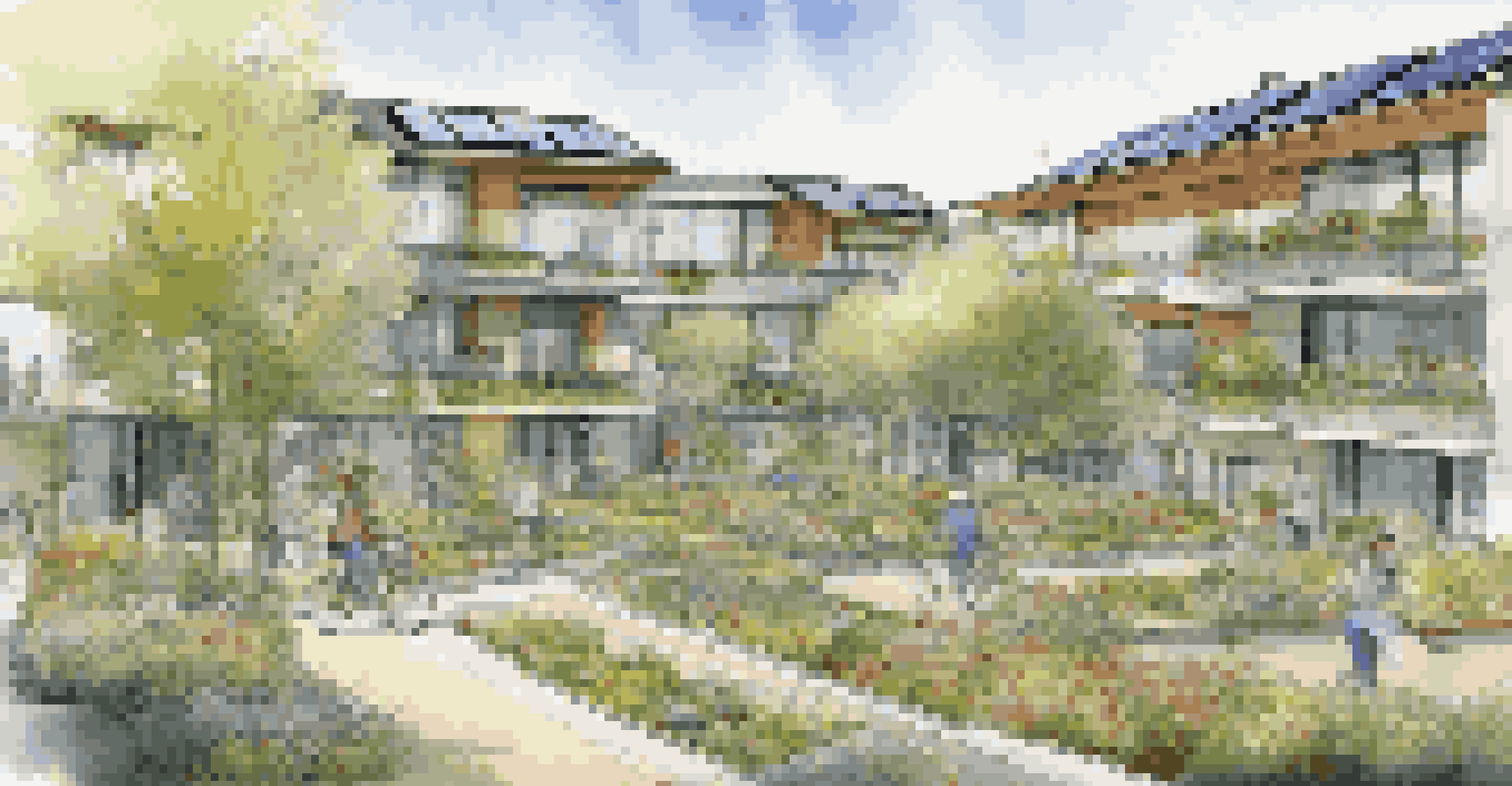How REITs Support Community Development and Urban Renewal

Understanding REITs and Their Role in Communities
Real Estate Investment Trusts, or REITs, are companies that own, operate, or finance income-producing real estate. They allow individual investors to earn a share of the income produced through commercial real estate ownership without actually having to buy, manage, or finance any properties themselves. This democratization of real estate investment can significantly enhance community development efforts.
The greatest threat to our planet is the belief that someone else will save it.
By pooling resources from multiple investors, REITs can undertake large-scale projects that might be unfeasible for smaller developers. This financial muscle enables them to invest in urban areas that require redevelopment, bringing in much-needed infrastructure and services. As a result, they play an essential role in revitalizing communities, making them more attractive to residents and businesses alike.
Moreover, REITs often focus on sustainable development practices, which can lead to greener and more livable urban environments. This commitment to sustainability not only enhances the quality of life for current residents but also appeals to potential newcomers looking for a vibrant, environmentally-conscious community.
Revitalizing Urban Spaces Through REIT Investments
One of the most visible impacts of REITs is their ability to revitalize neglected urban spaces. By investing in areas that have fallen into disrepair, REITs can transform these locations into thriving hubs. For instance, a vacant lot might be turned into a mixed-use development that includes retail, housing, and public spaces.

This transformation not only improves the aesthetic appeal of an area but also stimulates local economies. As new businesses move in, job opportunities are created, and the local tax base expands, allowing for better funding of public services. It's a ripple effect that can significantly uplift struggling neighborhoods.
REITs Boost Community Development
Real Estate Investment Trusts (REITs) enhance community development by pooling resources to revitalize urban areas and invest in essential infrastructure.
Additionally, these investments often incorporate community feedback, ensuring that developments meet the specific needs and desires of local residents. By engaging with the community, REITs can foster a sense of ownership and pride among residents, which is crucial for long-term urban renewal.
Affordable Housing Initiatives by REITs
Affordable housing is a critical issue in many urban areas, and REITs are increasingly stepping up to address this challenge. Some REITs specialize in developing and managing affordable housing projects, providing much-needed options for low and moderate-income families. This focus not only helps alleviate housing shortages but also supports community stability.
Real estate is not just about property; it's about people, community, and the relationships that bind us together.
By investing in affordable housing, REITs contribute to social equity, ensuring that all residents have access to safe and reliable homes. This investment can also positively impact local economies, as residents with stable housing are more likely to invest in their communities and contribute to local businesses.
Furthermore, affordable housing initiatives can be designed to include amenities such as parks, community centers, and public transportation options. These features enhance the overall quality of life for residents and foster a strong sense of community, making neighborhoods more desirable places to live.
Creating Public Spaces for Community Engagement
REITs understand that vibrant public spaces are essential for community engagement and cohesion. Many projects financed by REITs include parks, plazas, and other communal areas where residents can gather, socialize, and participate in local events. These spaces not only beautify neighborhoods but also serve as catalysts for community interaction.
By providing areas for farmers' markets, festivals, and recreational activities, REITs help strengthen community ties. This engagement can lead to increased volunteerism, local activism, and a collective effort to improve the neighborhood, creating a sense of belonging among residents.
Affordable Housing Solutions
REITs are increasingly focusing on affordable housing initiatives, providing vital options for low and moderate-income families and fostering community stability.
Incorporating public spaces into developments also reflects a commitment to community well-being. When residents have access to green areas and recreational facilities, it promotes healthier lifestyles and enhances the overall appeal of the community for families and individuals alike.
Job Creation and Economic Growth from REIT Projects
The projects undertaken by REITs often lead to significant job creation within communities. From construction jobs during the building phase to ongoing employment opportunities in retail and service sectors once projects are completed, REITs can substantially boost local economies. This job creation is vital for communities looking to recover from economic downturns.
Moreover, the presence of new developments can attract additional businesses to the area, further amplifying job opportunities and economic growth. As more companies establish themselves in revitalized areas, residents benefit from a wider variety of services and amenities, enhancing their quality of life.
In addition to direct employment, REIT projects often lead to increased spending in the local economy. As the population grows due to new developments, so does the demand for local goods and services, creating a thriving economic ecosystem that benefits everyone.
Sustainable Development Practices in REIT Projects
Sustainability is a growing concern in urban development, and many REITs are leading the charge with eco-friendly practices. By focusing on sustainable building materials, energy-efficient designs, and green spaces, they are setting a standard for environmentally responsible development. This not only benefits the planet but also appeals to a growing segment of eco-conscious investors and residents.
For example, some REITs are incorporating renewable energy sources, such as solar panels, into their projects. This not only reduces the carbon footprint of the buildings but also lowers utility costs for residents and businesses, making the community more financially sustainable in the long run.
Sustainable Urban Practices
Many REITs prioritize sustainable development practices, incorporating eco-friendly designs that improve the quality of life and appeal to environmentally-conscious residents.
Furthermore, sustainable practices can enhance the quality of life in urban areas. Green buildings often promote better air quality and provide residents with access to nature, which can lead to improved mental and physical health. By prioritizing sustainability, REITs contribute to the creation of livable, resilient communities.
The Future of REITs in Community Development
As urban areas continue to evolve, the role of REITs in community development is likely to expand. With increasing awareness of social and environmental issues, REITs are expected to align their investment strategies with community needs more closely. This trend could lead to even more innovative projects that prioritize inclusivity and sustainability.
Moreover, the rise of technology and data analytics is enabling REITs to better understand market demands and community preferences. By leveraging these insights, they can tailor their developments to create spaces that genuinely serve the population, fostering stronger community connections.

As we look to the future, REITs could become integral players in shaping the urban landscape, ensuring that community development efforts not only address current challenges but also anticipate the needs of future generations. This proactive approach will be crucial for building resilient, vibrant communities that thrive in the long run.